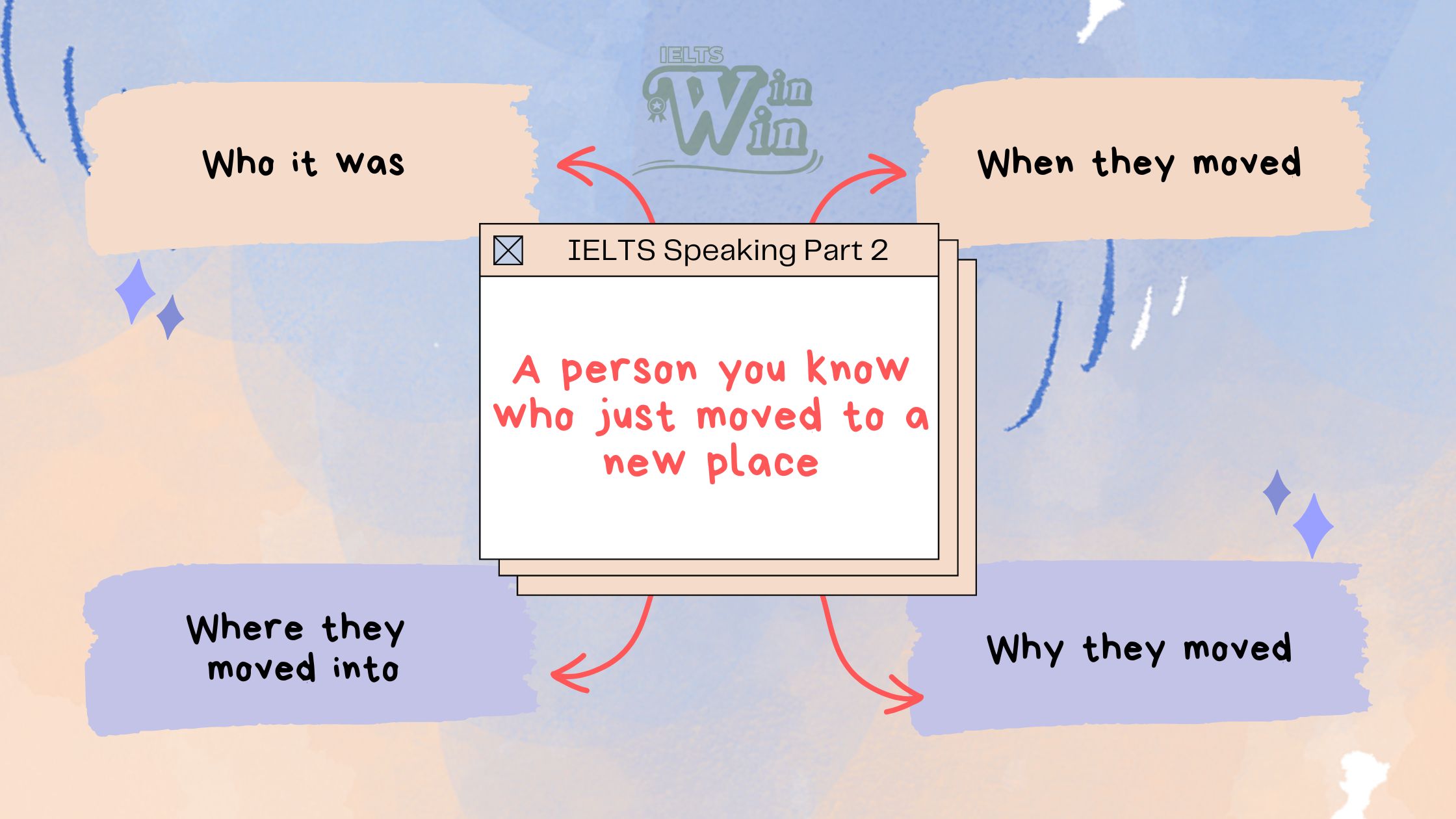✨Part 2: A person you know who just moved to a new place
- Who & when they moved
- Where they moved into
- Why they moved
One person I know who recently moved away is my neighbor, Mrs. Dao. She bid farewell to our neighborhood a couple of months ago.
Mrs. Dao's decision to move was primarily motivated by her family's changing needs. Her husband received a job transfer to another city, and it was a great opportunity for their family to explore new horizons and create a fresh start. They moved into a lovely suburban house in their new city. The neighborhood is known for its peaceful atmosphere and close-knit community. Mrs. Dao was excited about the spaciousness and the amenities the new house offered, which would better accommodate their growing family. The reasons behind Mrs. Dao's move centered on providing a better quality of life for her family. The new city offered excellent educational opportunities for their children and a thriving job market for her husband. It was a strategic decision to enhance their overall well-being and future prospects. As a neighbor, I felt a sense of nostalgia as Mrs. Dao prepared to leave. She had been an integral part of our community, always ready to lend a helping hand and engage in friendly conversations. While I will miss her presence, I am genuinely happy for her and her family as they embark on this new chapter in their lives.
Mrs. Dao's move is an example of embracing change and pursuing new opportunities. She prioritized her family's needs and made a thoughtful decision to enhance their future prospects. Although she is no longer our neighbor, I am certain that she will thrive in her new environment and create a warm and welcoming home for her family.
- Farewell /ˌfɛəˈwɛl/ (n) - lời chào tạm biệt
- Primarily /praɪˈmɛrəli/ (adv) - chủ yếu, đầu tiên
- Horizons /həˈraɪzənz/ (n) - tầm nhìn, tầm mắt
- Close-knit /kloʊs-nɪt/ (adj) - gắn bó chặt chẽ
- Spaciousness /ˈspeɪʃəsnəs/ (n) - sự rộng rãi, sự thoáng đãng
- Accommodate /əˈkɑːmədeɪt/ (v) - chứa đựng, tiếp đón
- Opportunities /ˌɑːpərˈtuːnətiz/ (n) - cơ hội
- Prospects /ˈprɑːspekts/ (n) - triển vọng, triển khai
- Prioritized /praɪˈɔːrətaɪzd/ (adj) - ưu tiên hàng đầu
Part 3 – Moving home
✨Why do people move to a new house?
People move to a new house for various reasons. Some common motivations for moving include changes in personal or family circumstances, such as starting a new job, getting married, or having children. Moreover Individuals may also move to pursue better educational opportunities, seek a safer or more desirable neighborhood, downsize or upgrade their living space, or be closer to friends and family. Economic factors, such as cost of living, housing affordability, or investment opportunities, can also influence the decision to move.
- Circumstances /ˈsɜːrkəmstænsɪz/ (n) - hoàn cảnh, tình huống
- Desirable /dɪˈzaɪrəbl/ (adj) - đáng mong muốn, tốt, thích hợp
- Economic /ˌiːkəˈnɑːmɪk/ (adj) - kinh tế, liên quan đến kinh tế
✨What problems do people have when moving home?
Moving home can come with its share of challenges. Some common problems include
issues such as packing, transporting belongings, and coordinating the moving process. Finding a suitable new home that meets one's requirements and preferences can also be a challenge, especially in competitive housing markets. Additionally, adjusting to a new environment, establishing new social connections, and adapting to a different neighborhood or community can pose initial difficulties. Finally, Financial considerations, such as managing moving costs and potential unforeseen expenses, can also be a concern.
- Coordinating: /koʊˈɔːrdəneɪtɪŋ/ (adj) - phối hợp, điều phối.
- Establishing: /ɪˈstæblɪʃɪŋ/ (v) - thành lập, thiết lập.
- Unforeseen: /ˌʌnfɔːrˈsiːn/ (adj) - không ngờ đến, không dự tính được.
✨Is it good to move house frequently?
The decision to move house frequently depends on individual circumstances and personal preferences. While moving can offer new opportunities, a change of scenery, and fresh experiences, it also involves disruption, stress, and expenses. Some people thrive on change and enjoy exploring different living environments, while others prefer stability and the familiarity of a long-term home. Frequent moves can provide variety and the chance to discover new communities, but they can also disrupt established social networks, routines, and stability. Ultimately, the "goodness" of moving house frequently varies from person to person and depends on their specific needs and priorities.
- Circumstances: /ˈsɜːrkəmstænsɪz/ (n) - tình huống, hoàn cảnh, điều kiện xảy ra.
- Disruption: /dɪsˈrʌpʃn/ (n) - sự gián đoạn, sự phá vỡ, sự làm rối loạn.
- Stability: /stəˈbɪləti/ (n) - sự ổn định, sự vững chắc.
- Long-term: /ˌlɔːŋˈtɜːrm/ (adj) - dài hạn.
- Disrupt: /dɪsˈrʌpt/ (v) - phá vỡ, gián đoạn, làm rối loạn.
✨Who has more difficulty when moving home? Young or old people?
Both young and old people can face difficulties when moving home, but the nature of these challenges may differ. Younger individuals, such as students or young professionals, may encounter obstacles related to finding affordable housing, adjusting to a new environment, and establishing new social connections. They may also need to balance the demands of their studies or career with the logistics of moving. On the other hand, older individuals or retirees may face challenges associated with downsizing, managing the physical demands of moving, and adjusting to a new community. They may also have established social connections and routines that are harder to replace. Overall, the specific difficulties can vary depending on the circumstances and individual resilience.
- Professionals: /prəˈfɛʃənəlz/ (n) - những chuyên gia, những người làm nghề chuyên nghiệp.
- Associated: /əˈsoʊsieɪtɪd/ (adj) - liên quan, kết hợp, có liên kết.
- Established: /ɪˈstæblɪʃt/ (adj) - được thành lập, được sáng lập, có uy tín.
✨Is it good or not for young people to live on their own?
Living on their own can offer young people a range of benefits and opportunities for personal growth. It can foster independence, self-reliance, and a sense of responsibility. Living alone allows young individuals to explore their interests, develop their identities, and make decisions without relying on others. It can provide a valuable learning experience, teaching essential life skills such as budgeting, time management, and problem-solving. Living alone can also offer privacy, freedom, and the chance to create a personal space that reflects individual preferences. However, it is important to consider that living alone also comes with challenges, such as increased financial responsibilities, potential loneliness, and the need for self-motivation and discipline.
- Independence: /ˌɪndɪˈpɛndəns/ (n) - sự độc lập, sự tự chủ.
- Budgeting: /ˈbʌdʒɪtɪŋ/ (n) - sự lập ngân sách, sự quản lý ngân sách.
- Problem-solving: /ˈprɑːbləm ˌsɑːlvɪŋ/ (n) - sự giải quyết vấn đề, sự xử lý vấn đề.
- Self-motivation: /ˌsɛlfˌmoʊtəˈveɪʃən/ (n) - sự tự động lực bản thân, sự thúc đẩy bản thân.
✨What skills do young people need to learn besides cooking?
Besides cooking, young people can benefit from acquiring a range of practical skills that can enhance their independence and self-sufficiency. These skills may include basic household maintenance, such as knowing how to perform minor repairs, manage utilities, or handle common household tasks. Financial literacy is also crucial, including skills related to budgeting, managing personal finances, and understanding basic concepts of saving and investing. Effective communication and interpersonal skills are valuable for building relationships, resolving conflicts, and navigating various social situations. Additionally, time management, organization, and problem-solving skills can help young people handle responsibilities, set goals, and overcome challenges in their personal and professional lives.
- Self-sufficiency: /ˌsɛlfˈsʌfɪʃənsi/ (n) - sự tự cung cấp, sự tự chủ.
- Crucial: /ˈkruːʃl/ (adj) - quan trọng, cốt yếu, chủ yếu.
- Interpersonal: /ˌɪntərˈpɜːrsənl/ (adj) - liên quan đến giữa các cá nhân, giữa các cá nhân và nhóm.
- Problem-solving: /ˈprɑːbləm ˌsɑːlvɪŋ/ (n) - sự giải quyết vấn đề, sự xử lý vấn đề.
✨What kind of people prefer to live by themselves?
The preference to live by oneself can vary among individuals and is influenced by personal circumstances, lifestyle choices, and personality traits. Some people may choose to live alone to have more privacy, independence, and control over their living environment. Others may prefer a quiet and introspective lifestyle or value personal space for creative pursuits, hobbies, or personal growth. Some individuals may find living alone more compatible with their preferences for solitude, autonomy, or personal routines. Furthermore, those who have had negative experiences in shared living arrangements or value their own company may also choose to live by themselves. It's important to note that living alone is a personal choice and can vary greatly depending on individual preferences and circumstances.
- Introspective: /ˌɪntrəˈspɛktɪv/ (adj) - tự xét nghiệm, phân tích bên trong, suy nghĩ sâu sắc về bản thân.
- Compatible: /kəmˈpætəbl/ (adj) - tương thích, hợp nhau.
- Arrangements: /əˈreɪndʒmənts/ (n) - sự sắp xếp, sự sắp đặt, sự sửa soạn.
Xem thêm các bài viết về Speaking Part 2 và 3 ở đây bạn nhé
Đừng ngần ngại để lại thông tin hoặc liên hệ với chúng mình qua địa chỉ sau đây để IELTS WinWin có thể hỗ trợ tốt nhất cho bạn nhé!
Địa chỉ: 118 Nguyễn Xuân Khoát, P. Tân Thành, Q. Tân Phú, TP. Hồ Chí Minh.
Fanpage: IELTS WinWin
Zalo: 0965 439 239 – 085 301 8788
Website: ieltswinwin.com



